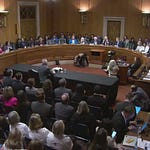Here are some areas within the Federal Register that might raise concerns about potential overreach, fraud, waste, abuse, or over-regulation. Or, just things you should know about TODAY’s Federal Register!
● Lobbying Restrictions and Penalties: The Federal Register outlines new restrictions on lobbying, with civil penalties for prohibited expenditures or failure to disclose, ranging from $24,496 to $244,9581. These significant penalties for lobbying infractions may raise concerns about the extent to which the government regulates speech and advocacy.
● Suspension and Debarment Procedures: Proposed rules aim to align procurement and non-procurement suspension and debarment procedures234. A key difference is that a proposed debarment under the Federal Acquisition Regulation (FAR) immediately excludes a party, unlike in non-procurement transactions3. This immediate exclusion power, particularly in government contracts, could be seen as a potential area of abuse or overreach, especially given that the FAR Council is continuing to keep both tools, allowing the suspending and debarring official the discretion to choose5.
● Airworthiness Directives: The Federal Aviation Administration (FAA) issues airworthiness directives, such as those for Lockheed Martin and Pratt and Whitney, which mandate specific actions for aircraft2. While these are for safety, the detail and frequency of such directives could be viewed as burdensome regulation by some. The FAA will post all comments received, without change, to regulations.gov, including any personal information provided, unless marked as "Confidential Business Information"6.
● Toxic Substances Control Act: The Environmental Protection Agency (EPA) has a program for new chemicals, including a decision framework for hazard identification related to eye irritation and corrosion2. While the intent is to protect public health, the scope of regulatory oversight under the Toxic Substances Control Act can be very broad.
● Federal Financial Assistance: The Federal Register notes that Federal financial assistance is typically for public purposes of support or economic stimulation, rather than for the direct benefit of the U.S. Government5. This distinction between the nature of contracts versus financial assistance raises questions about accountability and oversight.
● Privacy Act Notices: The Department of Housing and Urban Development (HUD) publishes notices regarding Privacy Act systems of records7. While these are required to be published, the breadth of these systems and the amount of personal data collected by the government may surprise the average citizen. The Privacy Act also applies to non-Federal agencies that receive records from a Federal agency8.
● Information Collection Activities: Numerous agencies, including the Agency for International Development (USAID), the Department of Agriculture, and the Department of the Air Force, publish notices of information collection activities, like workforce and organizational surveys91011. These collections of information, some of which are mandatory and some voluntary, raise questions about the necessity, utility, and burden of the information collected by Federal agencies121314.
● Medicare and Medicaid: The Centers for Medicare & Medicaid Services (CMS) engages in a variety of information collection activities. For example, the Behavioral Health Clinic Quality Data Reporting Template is intended to streamline data collection, but requires significant time investment from private and governmental entities15. There are also notices for the collection of information relating to Medicaid and CHIP state plan amendments, waivers, demonstrations and reporting16.
● Extralabel Drug Use in Animals: The FDA has submitted a request to the Office of Management and Budget (OMB) for review and clearance on the topic of extralabel drug use in animals, which includes establishing safe levels for drug residue1718. The FDA published a 60-day notice in the Federal Register requesting public comment but received none19.
● Artificial Intelligence Regulation: The Federal Register contains discussion of the regulation of AI2021. While the goal of these regulations is to promote innovation while protecting civil liberties, there are areas of significant concern. For example, it is noted that several commenters recommended that the definition of Predictive Data Systems (DSI) be revised to take a tiered approach to requirements based on the level of risk to patients, suggesting that low risk Predictive DSI tools should be exempt22. The definition of Predictive DSI was established to be agnostic to both use case and party that develops the Predictive DSI, which some could consider government overreach23. The Federal Trade Commission (FTC) has also been active in addressing AI through law enforcement, business education, and policy initiatives2425.
● Health IT Regulations: There are a number of proposed rules and notices related to health IT, particularly related to interoperability and data sharing, which could be burdensome to smaller health organizations2627. The costs and benefits of these rules are also explored27. In addition, the rule includes the requirements to report data on a variety of health information technology outcomes28. Some of these rules and notices may be confusing or concerning to the average American who does not work in health information technology.
● Environmental Regulations: The Environmental Protection Agency (EPA) is proposing to revise regulations regarding the scope of "applicable requirements" under state operating permit programs and the Federal Operating Permit Program2930. This proposed rule does not have any federalism implications and will not have a direct effect on the states, however, it may have indirect effects on state governments31.
● Transparency and Public Participation: The Federal Register also discusses public participation and comment opportunities related to various proposed rules and information collection activities123233. While these notices are intended to promote transparency, the sheer volume and complexity of these notices could make it difficult for the average citizen to meaningfully participate. There are also cases when the agency publishes a notice requesting public comment, but does not receive any1934. The public is invited to submit comments concerning whether the collection of information is necessary, the accuracy of the agency's estimate of the burden, ways to enhance the quality of the information collected, and ways to minimize the burden of the collection of the information35.












Share this post